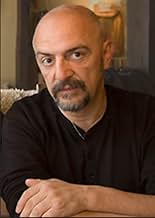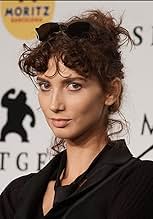IMDb-BEWERTUNG
6,2/10
8326
IHRE BEWERTUNG
Béatrice Dalle und Charlotte Gainsbourg drehen einen Film, in dem Geschichten über Hexen erzählt werden - aber das ist noch nicht alles. "Lux Æterna" ist auch ein Essay über Kino, die Liebe ... Alles lesenBéatrice Dalle und Charlotte Gainsbourg drehen einen Film, in dem Geschichten über Hexen erzählt werden - aber das ist noch nicht alles. "Lux Æterna" ist auch ein Essay über Kino, die Liebe zum Film und die Hysterie am Set.Béatrice Dalle und Charlotte Gainsbourg drehen einen Film, in dem Geschichten über Hexen erzählt werden - aber das ist noch nicht alles. "Lux Æterna" ist auch ein Essay über Kino, die Liebe zum Film und die Hysterie am Set.
- Auszeichnungen
- 1 Nominierung insgesamt
Empfohlene Bewertungen
The "Lux Aeterna" (18+) is one more cinematic experiment from Gaspar Noé. Noe gained the worldwide fame in 2002, thanks to the scandalous film "Irreversibility" with Monica Bellucci and Vincent Cassel.
"Lux Aeterna" grew out of a collaboration between Saint Laurent and Gaspar Noé, the master of light and audience reactions, it is a surreal and hysterically beautiful narrative of a day on the set of a film about the Inquisition in the underground aesthetics of the 1990s. The shimmering light and quotes from Dostoevsky, Godard, Fassbinder and other iconic figures add contrasts to the film.
Two icons of French cinema of the last decades, Beatrice Dalle and Charlotte Gainsbourg, are the driving mechanisms of the film. At first, they improvise in the dialogue, where they are ironic and exaggerative, but they tell about the creative underside of almost any film or production, and later they heat up emotional tension to the level of the atrocities of the Inquisition or hellish cauldrons. The aesthetic is amazing: crosses and bonfires, Charlotte in a Saint Laurent dress and the insane energy of Beatrice, covering even the madness of light and music at the end of the film. Beatrice is the witch in this story: charismatic, bright, even weird and uncomfortable for others, and the film within the film is her brainchild, which others are trying to appropriate.
The film turned out to be stylish and a bit provocative: about fashion and its victims, about vices and the fact that not everything is so simple with them, and, finally, about human selfishness. A neon beam pierces the "Lux Aeterna" with the truth that witches have a hard time even in the 21st century, because the crowd is always ready to lynch.
"Lux Aeterna" grew out of a collaboration between Saint Laurent and Gaspar Noé, the master of light and audience reactions, it is a surreal and hysterically beautiful narrative of a day on the set of a film about the Inquisition in the underground aesthetics of the 1990s. The shimmering light and quotes from Dostoevsky, Godard, Fassbinder and other iconic figures add contrasts to the film.
Two icons of French cinema of the last decades, Beatrice Dalle and Charlotte Gainsbourg, are the driving mechanisms of the film. At first, they improvise in the dialogue, where they are ironic and exaggerative, but they tell about the creative underside of almost any film or production, and later they heat up emotional tension to the level of the atrocities of the Inquisition or hellish cauldrons. The aesthetic is amazing: crosses and bonfires, Charlotte in a Saint Laurent dress and the insane energy of Beatrice, covering even the madness of light and music at the end of the film. Beatrice is the witch in this story: charismatic, bright, even weird and uncomfortable for others, and the film within the film is her brainchild, which others are trying to appropriate.
The film turned out to be stylish and a bit provocative: about fashion and its victims, about vices and the fact that not everything is so simple with them, and, finally, about human selfishness. A neon beam pierces the "Lux Aeterna" with the truth that witches have a hard time even in the 21st century, because the crowd is always ready to lynch.
As a fan of Gaspar Noé, I enjoy his movies even when I feel sick of what I see in his movies. I'm also pretty sure that the most catchy element of his movies is the visuals. So far, i've seen his every feature films except Love. Climax, Irreversible and Enter the Void, which are mostly the favorites of the audience, achieved giving fancy visuals. Strangely, visuals of Lux Aeterna does not make you satisfied since the story leads to literally nowhere worthy. Instead, this time Gaspar Noé tries to introduce a point of view to role of woman in film industry and also in history. I can say that he does it well. Lux Aeterna is a "must watch" for Noé fans because in every second you will feel the style of Gaspar Noé. But if you are not a fan, this movie is a pure boredom and agony.
Even with this short runtime, the movie is stressful work, its overly pretentious, nearly a self-parody. The last minutes are just suffering for viewers and characters. Its bland and overly symbolic, does not create any character arc, every one of the characters is just a cut out paper, not even two dimensional. L'art pour l'art, right? But in this case, its just artificial. Meaningless. And the worst: It does not entertain. Not one moment.
While watching the movie You are definitely feeling the stress on the set. If you want to watch a regular cinema and if you don't know who is Gaspar Noe you might say "what was that ? What happened ?". As in the previous films of Gaspar you are not just standing there and watching the movie you feel what characters feels.
7 months after its premiere in Cannes (which I attended), I can't believe there is still no review of Lux Aeterna, so here is mine:
I think this film is admirable in many ways although not devoid of flaws, the main one being that for the nth time, Noé pulls the same expectable tricks with colorful lighting, flickering images and references to his classics (even just the title, "Lux Aeterna" is the György Ligeti eerie choir piece used in "2001: A Space Odyssey"), etc. So that does get a little unimaginative, especially since the atmosphere and development are very close to his latest long feature, "Climax".
That said, everything else is interesting. From the Dalle / Gainsbourg improvised dialogue (made hilarious by Dalle's very personal way of saying things - let's hope that won't get lost in translation) to the creative ways in which Noé uses the screen space. I couldn't stress this enough: *This Must Be Watched In A Movie Theater* ! Although I do enjoy smaller screens, I'm afraid a small screen won't cut it with this one. As usual with Noé, the experimental elements are present and the big screen is a must in order to enjoy them fully.
Many references are made throughout the film to Carl Dreyer's classic "Vredens Dag" from 1943, also using footage from it. It does serve a purpose but cannot really be discussed without spoiling.
I believe many interpretations of the film are possible. From mysogynistic to feminist. I'm definitely going with the latter. The end scene is intense in symbolism, deafening sound, flickering visuals and a creative use of the screen. If you suffer from epilepsy: STAY AWAY. As usual, Noé tries our patience and is into trying to shock us - but that's getting a bit old. Nothing gory though, so the faint of heart can watch. The camera flies from room to room as the crescendo builds up progressively until smothering hysteria. The film only lasts 50mn but it wouldn't necessarily have made more sense to make it any longer.
This is also definitely a film about film-making and how things go, on and off set. It's a film about actresses - how some can impose their strength or choose to go with what is asked of them.
This film will divide. Some will see it as arty, vaccuous and pointless. Others will find depth and meaning in it, but not necessarily the same meaning. I believe this is the best Noé film in a long time. Overall better than "Climax" or "Love". If you can get past Noé's antics, it is not only enjoyable, it is mostly an undeniable breath of fresh air in contemporary cinema.
I think this film is admirable in many ways although not devoid of flaws, the main one being that for the nth time, Noé pulls the same expectable tricks with colorful lighting, flickering images and references to his classics (even just the title, "Lux Aeterna" is the György Ligeti eerie choir piece used in "2001: A Space Odyssey"), etc. So that does get a little unimaginative, especially since the atmosphere and development are very close to his latest long feature, "Climax".
That said, everything else is interesting. From the Dalle / Gainsbourg improvised dialogue (made hilarious by Dalle's very personal way of saying things - let's hope that won't get lost in translation) to the creative ways in which Noé uses the screen space. I couldn't stress this enough: *This Must Be Watched In A Movie Theater* ! Although I do enjoy smaller screens, I'm afraid a small screen won't cut it with this one. As usual with Noé, the experimental elements are present and the big screen is a must in order to enjoy them fully.
Many references are made throughout the film to Carl Dreyer's classic "Vredens Dag" from 1943, also using footage from it. It does serve a purpose but cannot really be discussed without spoiling.
I believe many interpretations of the film are possible. From mysogynistic to feminist. I'm definitely going with the latter. The end scene is intense in symbolism, deafening sound, flickering visuals and a creative use of the screen. If you suffer from epilepsy: STAY AWAY. As usual, Noé tries our patience and is into trying to shock us - but that's getting a bit old. Nothing gory though, so the faint of heart can watch. The camera flies from room to room as the crescendo builds up progressively until smothering hysteria. The film only lasts 50mn but it wouldn't necessarily have made more sense to make it any longer.
This is also definitely a film about film-making and how things go, on and off set. It's a film about actresses - how some can impose their strength or choose to go with what is asked of them.
This film will divide. Some will see it as arty, vaccuous and pointless. Others will find depth and meaning in it, but not necessarily the same meaning. I believe this is the best Noé film in a long time. Overall better than "Climax" or "Love". If you can get past Noé's antics, it is not only enjoyable, it is mostly an undeniable breath of fresh air in contemporary cinema.
Wusstest du schon
- WissenswertesParamedics were waiting outside of the premier at Cannes Film Festival, in case audience members would become sick or faint during the screening.
- Crazy CreditsThe end credits were stylized Latin script used in the Middle Ages (e.g. with the letter "v" instead of "u") - This is how the title itself is written: Lvx Æterna. All the actor names included first names only, no family names. As the director himself said, in the times when Latin language was used, people didn't use surnames (family names), so he decided to put only first names in the end credits.
- VerbindungenFeatures Die Hexe (1922)
Top-Auswahl
Melde dich zum Bewerten an und greife auf die Watchlist für personalisierte Empfehlungen zu.
- How long is Lux Æterna?Powered by Alexa
Details
Box Office
- Bruttoertrag in den USA und Kanada
- 50.027 $
- Eröffnungswochenende in den USA und in Kanada
- 8.945 $
- 8. Mai 2022
- Weltweiter Bruttoertrag
- 323.829 $
- Laufzeit
- 51 Min.
- Farbe
- Seitenverhältnis
- 1.33 : 1
- 2.35 : 1
Zu dieser Seite beitragen
Bearbeitung vorschlagen oder fehlenden Inhalt hinzufügen


![Bande-annonce [OV]](https://m.media-amazon.com/images/M/MV5BMWM2MzRmZmUtY2YxYy00ZTNhLTkwMDgtYWM0NDA0NDlhMDQzXkEyXkFqcGdeQXRyYW5zY29kZS13b3JrZmxvdw@@._V1_QL75_UX500_CR0)
































